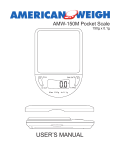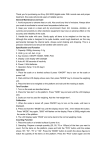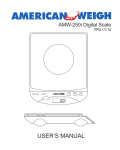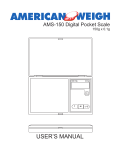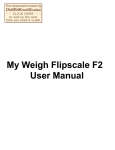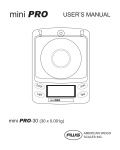Download LB-1000 User Manual - American Weigh Scales Inc
Transcript
American Weigh Scales, Inc. LB- 1 0 0 0 Compact Bowl Scale g LB-1000 User Manual LB-1000 Manual Thank you for purchasing the American Weigh LB-1000 digital scale. Please read all operating instructions carefully before use. This electronic scale is a precision instrument. With normal care and proper treatment, it will provide years of reliable service. Never load the scale with more than the maximum capacity. Overloading will permanently damage it! Avoid any exposure to extreme heat or cold. Your scale works better when operated at normal room temperature. Always allow the scale to acclimate to normal room temperature for at least one hour before use. Give your scale sufficient warm up time. Usually 30-60 seconds before calibration to give the internal components a chance to stabilize. Keep your scale in a clean environment. Dust, dirt, moisture, vibration, air currents and a close distance to other electronic equipment can all cause an adverse effect on the reliability and accuracy of your scale. Handle with care. Gently apply all items to be weighed onto tray top. Although this scale is designed to be quite durable, try to avoid rough treatment as this may permanently damage the internal sensor. Avoid shaking, dropping or otherwise shocking the scale. This is a precision instrument and must be handled with extreme care. Only operate the scale on a stable, vibration free surface. I. OPERATION 1. Press [ON/MEM] key. 2. Wait until “0.0” is displayed. 3. Put the object(s) on the weighing platform. 4. Using the [MODE/CAL] key, you can switch between the weighing units. II. TARE WEIGHING 1. Turn on scale as described above. 2. Place the “tare item” (ie. bowl) on the platform. 3. Press [TARE] and wait until “0.0” is displayed. 4. Add the “net-weight-item”. Note: Turning the scale on with the tare item on the weighingplatform achieves the same effect. III. CALIBRATION Calibration is NOT required before first use. Only calibrate if scale is not weighing properly. 1. Remove any items from the scale and press [ON/ MEM] to turn the scale on. 2. Wait til the scale zeros then press and hold the [MODE/CAL] key until “400.0” is displayed. 3. Gently place the two 200g weights (included) onto the weighing platform and wait 4 seconds. Do not disturb the balance during this time. 4. If calibration is successful “F” will be displayed. Otherwise, if the display shows “E”, an error has occured and you should repeat calibration. 5. Press [TARE] to return to normal weighing mode. IV. COUNTING FEATURE 1. To enter parts counting mode, press [CAL/MODE] to scroll through the weighing modes until "C" appears on the display. The minimum sample quantity is 5 and will be displayed as "S=5" 2. Continue to press the [CAL/MODE] key to select the desired parts counting unit: 5, 10, 20, 50 pieces. After "50" is displayed the scale will cycle back to g (grams). 3. With the sample quantity value still displayed on the LCD, place the actual sample quantity on the platform. Allow the sample to stabilize for 3~5 seconds then press [TARE]. The sample quantity is now set. 4. You can now add any number of the item on the scale and a count will be displayed. V. MEMORY FUNCTION 1. With the balance on, press the [TARE] key to ensure the balance is zeroed. 2. Place an item on the scale and press [ON/MEM] when the display is stable. This action adds the displayed weight into the memory buffer which is normally set to zero. The display will show "0.0" again. 3. Repeat step 2 above as many times as you need, until you are ready to see the cummulative result. 4. To view the cummulative weight, press the [ON/ MEM] key. The total will be displayed and the memory buffer will return to zero. 5. Press [TARE] to zero out the balance and the scale is ready for normal weighing again. VI. TROUBLESHOOTING The primary reasons for inaccuracy or malfunction are low batteries, incorrect calibration, overload or operating on an unstable surface. Please keep this in mind and maintain and operate your scale properly. This scale is a precise instrument and must be handled with the utmost care and caution. [Display] Elimination of errors Change the batteries. You are overloading the scale. Remove the excess weight immediately to prevent damage to the internal load cell. There was a calibration error. Repeat calibration. Specifications Model Capacity Resolution Weighing Units LB-1000 0.1g / 0.005oz / 0.005ozt / 0.05dwt 1000g / 35.27oz / 32.15ozt / 643.1dwt 5-1/8 diameter two (2) x 200g 4 - Digit Backlit LCD grams (g), ounces (oz), troy ounces (ozt), pennyweights (dwt) Calibration Weights (Included) 5.5 x 7.25 x 1.5 Display Platform Dimensions (inches) 1.0 lb 4 x AA (included) Scale Dimensions (inches) Power Weight






